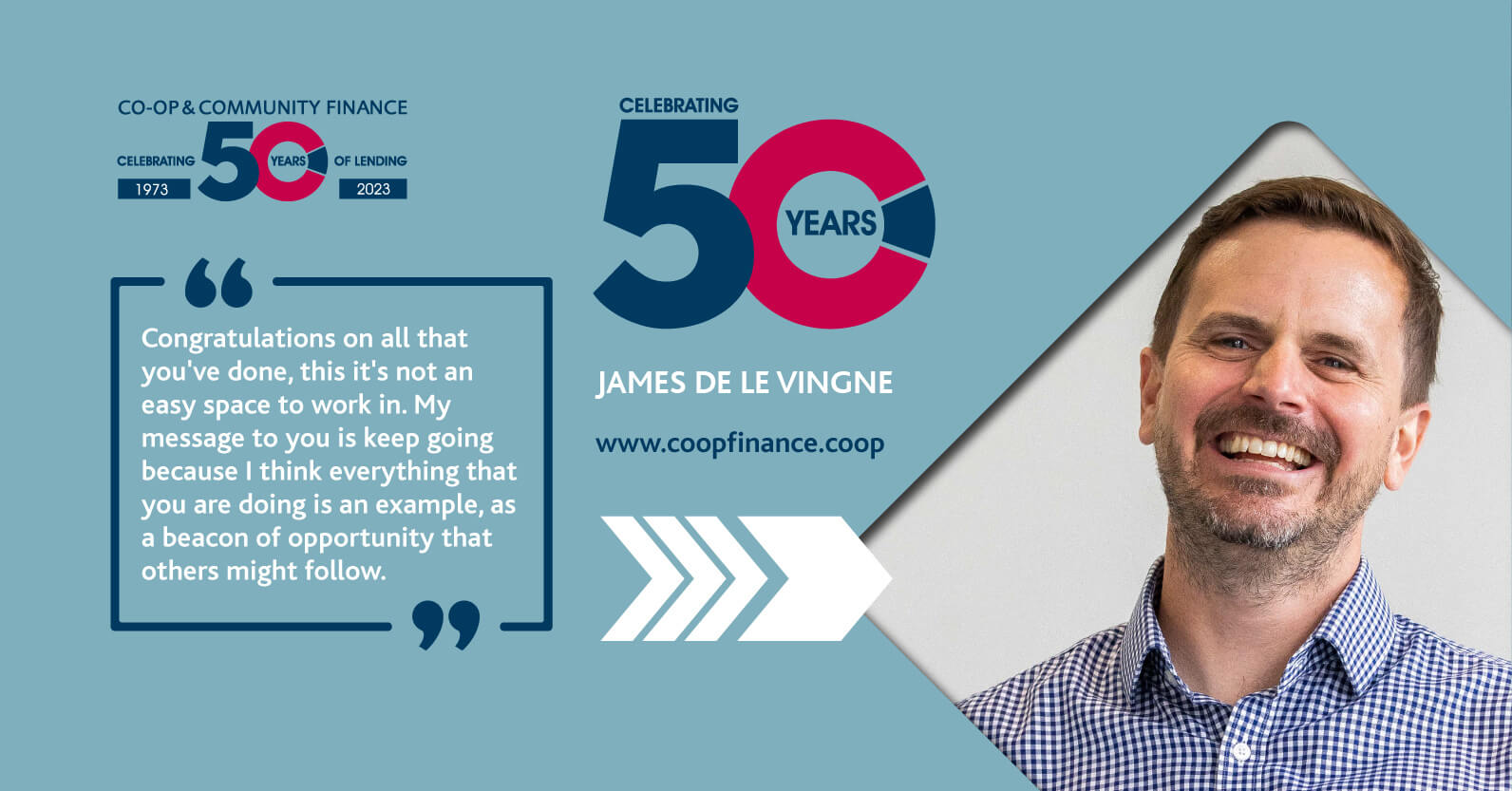Fifty years of friendship and finance – meet James de le Vingne
As we head towards the end of our fiftieth year, we’re closing our year-long interview series by talking to people at key organisations which we partner and work with. Today we meet James de le Vingne, CEO at the Employee Ownership Association (EOA)
“I’ve worked in the sector for a good while and I’ve always known about ICOF. I joined the EOA on Valentines Day in 2022, and before that I led the Co-operatives UK Development Team for eight years. For the last two and a half years of that, I was a director of the Coop Loan Fund (CLF)
I enjoyed supporting the CLF. The fact that cooperatives contributed to that fund meant that there was an inbuilt understanding of what coops are about, what they’re trying to achieve, and why they might need a more aligned lender – someone who understood their structure and who actually saw that as a strength to their business rather than a rabbit warren of governance that needed explaining. With ICOF steering and managing it, on behalf of those coops who had put funds into it, it often provided the final piece of the financial jigsaw for new coops, coops undertaking new initiatives who needed investment into their premises or facilities, or coops who were just looking for grant funding to try and develop a new product or service.
The CLF helped a lot of fantastic businesses to get their projects over the line. We saw really strong success rates and very few business failures. This meant that that fund has continued to recycle its capital and grow.
Later, as I was exiting Co-operatives UK, I had the pleasure of working with the ICOF team on a big funded program which was trying to fund community groups through community share mechanisms and blending community shares with the debt facility provided by ICOF. That was seen as really quite pioneering in a space that has itself proven to be really pioneering. And so I’m excited now in my new role to see that program up and running.
As we look to the future, I’m glad to see ICOF writing about its EDI journey – one of the reasons I said yes to the CLF is that I wanted to be part of improving diversification of their board. When I joined the board, it was all men, I was able to recommend a few potential candidates, one of whom subsequently joined the board.
A lot of the early ICOF loans were about worker buyouts to create worker co-ops, elements of which have shaped today’s employee ownership models. In terms of their values, that alignment and understanding of the governance models that are likely to exist behind employee owned business is really strong. But nowadays, we are seeing lending requirements within businesses that are transitioning to employee ownership in the tens of millions, which is above the kind of capital that CCF has in its place.
SMEs at large across the UK struggle to access capital. The growth of the CDFI network and business lenders like ICOF is really important in plugging that gap. ICOF’s strong track record is a great example of what the CDFIs can do and should be doing and the type of support that they can offer. I see them being able to lend into employee owned businesses or cooperatives, as well as other forms of social enterprise and charity and being part of that broader narrative around business with purpose.
The community model is really powerful. I attended both party conferences recently to hear our political parties on both sides of the house acknowledge the role of community owned enterprise. I would love to see the hard work lifted from those groups, because it is a huge slog to get those initiatives up and running and to create that blended finance package that enables them to acquire assets, but it’s a model that works, that should be accelerated. and grown. What I’d love to see is more medium to large businesses engaging in that, investing their capital in mechanisms like community shares to give back to the community. I see a greater pluralisation of the economy more generally on the horizon. These creative instruments like the employee ownership trust – which is only 10 years old itself – the community benefit society and community shares have the potential to come together. I can see CDFIs playing a really important part of the narrative around regional banks, and even with structural funds, perhaps like the British Business Bank – finding an alignment between what they’re trying to achieve in terms of big business, but actually recognising that majority of the UK is employed in SMEs and micro enterprises and actually channelling some of that that large funding and the dormant bank funding back into places like ICOF to enable them to do more.
I also think targeted regional approaches are going to be really important so I can imagine a world where ICOF is potentially focusing in on their local footprint around the Bristol area and encouraging new institutions to emerge in other geographic areas. Small and local is going to be a real value add and so understanding your local business space is going to be increasingly key. I think ICOF have probably got a role in that.
So happy, happy birthday to the team, past and present. Congratulations on all that you’ve done, this it’s not an easy space to work in. My message to you is keep going because I think everything that you are doing is an example, as a beacon of opportunity that others might follow. So keep going.”

